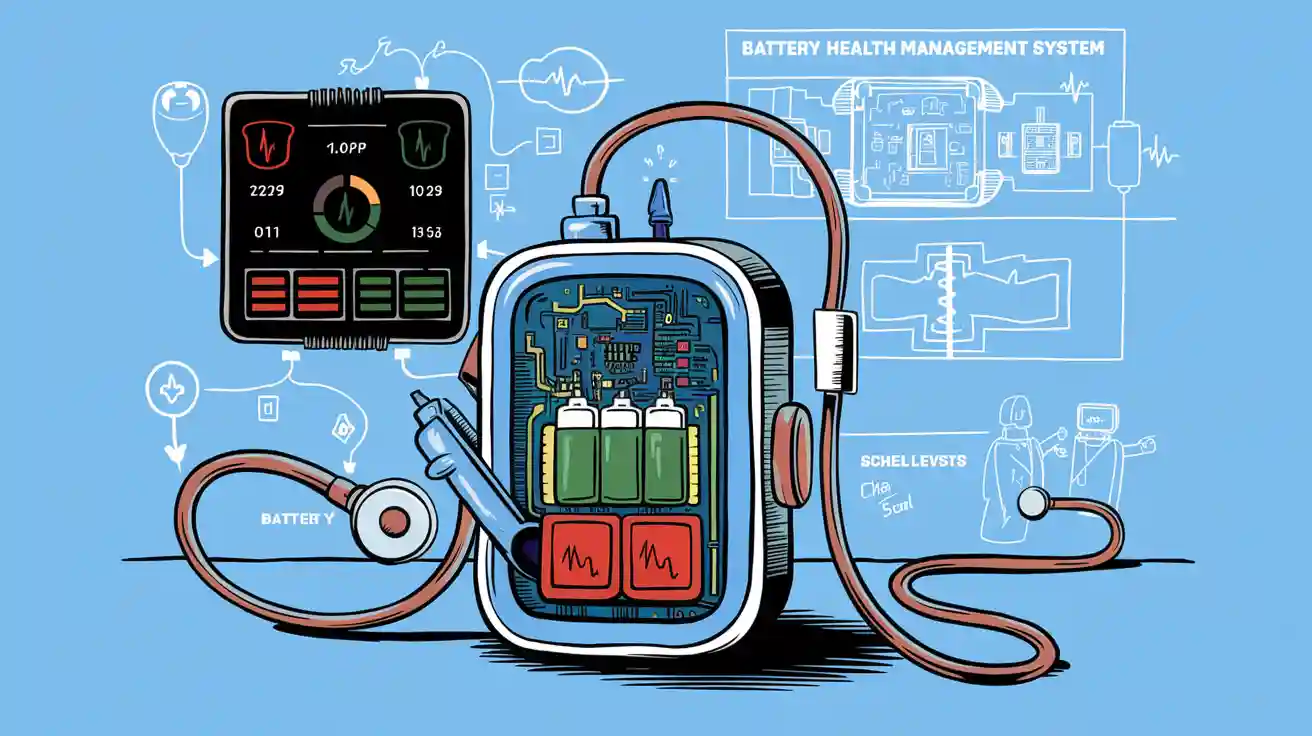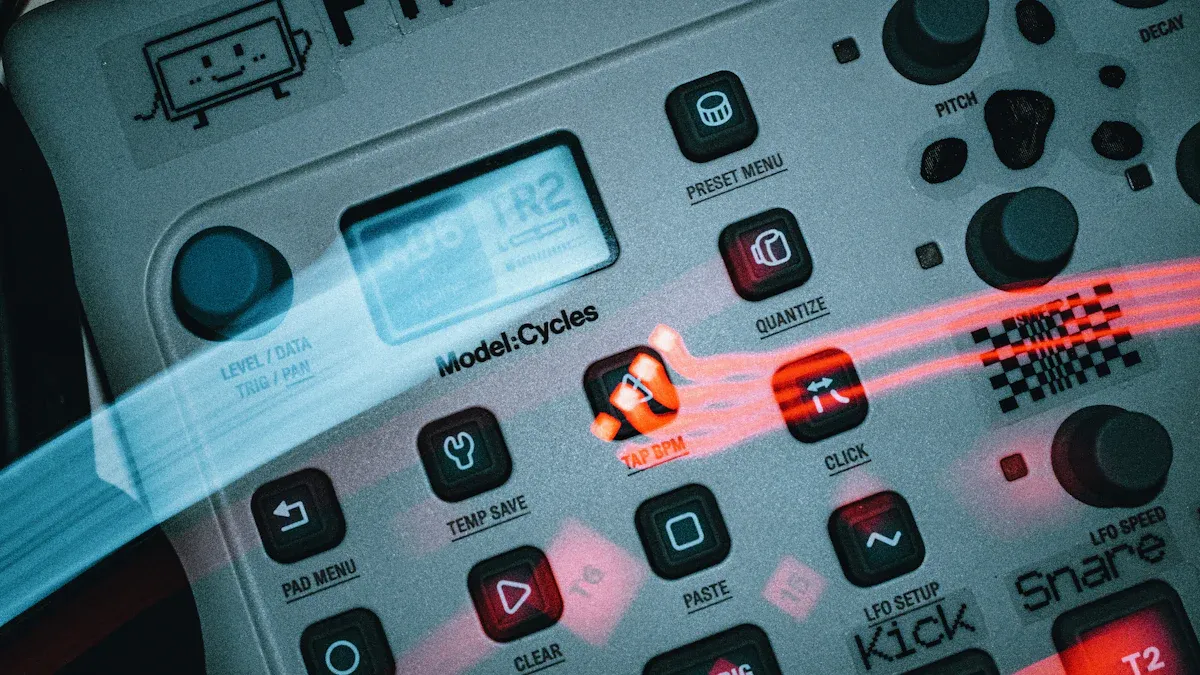
Medical device reliability depends on advanced battery management. Medical equipment faces unique safety and reporting demands. You can address these needs with custom bms solutions and lithium battery packs.
Up to 50% of system breakdowns in medical devices result from battery failures.
IoT-enabled monitoring improves real-time state of charge (SoC) and state of health (SoH) data, enhancing patient safety.
Key Takeaways
Custom BMS solutions enhance battery performance and reliability in medical devices, reducing the risk of failures that can compromise patient safety.
Real-time monitoring of battery state of charge (SoC) and state of health (SoH) allows for predictive maintenance, ensuring devices operate efficiently and safely.
Investing in custom lithium battery packs with advanced BMS features leads to lower maintenance costs and improved device uptime, ultimately benefiting healthcare operations.
Part 1: Custom BMS Solutions for Medical Devices

1.1 BMS Overview
You rely on medical devices to deliver consistent performance in critical environments. Custom bms solutions play a vital role in meeting the unique voltage, current, and thermal demands of these devices. Unlike standard battery management systems, custom bms solutions are engineered to match the specific requirements of each medical application.
Feature | Standard BMS | Custom BMS Solutions |
|---|---|---|
Functions | Basic protection | Advanced features: state of charge, state of health, sleep mode, double protection |
Safety | Limited safety features | Enhanced safety tailored to medical device needs |
Custom bms solutions integrate advanced monitoring and control features. You benefit from real-time state-of-charge and state-of-health data, which help you predict battery behavior and extend device lifespan. These solutions also support sleep modes and double protection, reducing the risk of unexpected failures.
Tip: Custom lithium battery packs paired with smart bms provide superior battery performance and battery efficiency, especially in portable medical equipment.
1.2 Safety and Reliability
Safety and reliability are non-negotiable in healthcare. Custom bms solutions address the most common challenges faced by medical devices:
Long-term reliability with predictive maintenance to minimize failures.
Human factors engineering for intuitive interfaces and clear warnings.
Diverse power requirements across medical devices, requiring versatile bms design.
Fast-charging capabilities managed by advanced charge control algorithms.
Custom bms solutions ensure that devices like ventilators and patient monitors operate without downtime. Hospitals depend on continuous power, and any interruption can threaten patient safety. Advanced protection mechanisms initiate safety procedures, such as circuit shutdown or charging control modifications, during anomalies. Balancing features equalize cell voltages, enhancing pack performance and ensuring uniform deterioration.
Feature | Description |
|---|---|
Protection Mechanisms | Initiates safety procedures during anomalies |
Balancing | Equalizes cell voltages for uniform performance |
High Reliability | Provides system-level security and continuous operation |
Efficient Thermal Management | Maintains optimal battery temperature |
Flexibility in Customization | Allows modification of firmware, hardware, and protocols |
Custom lithium battery packs use advanced chemistries like Lithium Manganese Oxide (LMO) and Lithium Iron Disulfide (LiFeS2), which offer nominal voltages of 3.0 V and 1.5 V, respectively. These chemistries provide high energy density and low internal resistance, making them ideal for digital and portable medical applications.
Note: Medical-grade lithium batteries must comply with strict safety standards such as IEC 60601, ANSI/AAMI ES 60601-1, and UL 2054. These standards protect both patients and healthcare staff.
You must also consider regulatory requirements. The EU Battery Regulation 2023/1542 and UN38.3 recommendations require rigorous testing and certification for batteries in medical devices. Custom bms solutions help you meet these standards by integrating protection circuit modules, cell balancing, and real-time communication protocols.
1.3 Energy Requirements
Medical devices demand precise energy management. Custom bms solutions are tailored to meet the voltage, current, and thermal needs of each device. You benefit from protection against overcharging, over-discharging, short circuits, and thermal runaway. Balancing features extend battery life, while state-of-charge and state-of-health estimation provide accurate battery status.
Battery Type | Nominal Voltage | Specific Energy (Wh/kg) |
|---|---|---|
Nickel-Zinc (NiZn) Alkaline | 1.5 V | 200 |
Lithium Manganese Oxide (LMO) | 3.0 V | 280 |
Custom Power develops battery packs for surgical procedures, emergency room use, and therapeutic practices. The engineering team tailors each pack to the device’s requirements, ensuring compliance with ANSI/AAMI ES 60601-1 and other relevant standards. Environmental adaptability is crucial; custom bms solutions resist extreme temperatures, humidity, shock, and vibration.
The implementation of energy-efficient bms with active cell balancing enhances battery life and performance.
Real-time energy indication and improved battery pack performance reduce device downtime.
Cost-benefit analysis shows that custom bms solutions lower maintenance costs and improve battery efficiency.
Custom bms solutions also address common failure modes, such as cell imbalance, overcharging, undercharging, temperature-related issues, and communication errors. Features like overcharge detection, thermal management, and regular maintenance protocols ensure reliable operation and extend battery lifespan.
Alert: Advanced bms features, including fuel gauging and state-of-health tracking, may increase design and component costs. However, these investments pay off by reducing maintenance expenses and improving device reliability.
You can optimize depth of discharge and maximize battery performance by choosing custom lithium battery packs with smart bms. These solutions provide the flexibility and reliability needed for modern healthcare environments.
Part 2: SoC and SoH Reporting in Custom Lithium Battery Packs

2.1 SoC and SoH Metrics
Accurate estimation of state of charge and state of health is essential for optimizing battery lifespan and device reliability in medical environments. You rely on precise SoC data to understand how much usable energy remains in your custom lithium battery packs. The most reliable method calculates SoC using the formula SOC = 1 – Qm/QD, which relates discharge time and battery voltage. This approach provides consistent results across lithium-ion, lithium-polymer, and LiFePO4 chemistries.
For SoH, expansion force analysis has emerged as a leading technique. You benefit from full-field surface stress profiling, which integrates deformation across the battery interface. This method offers superior noise immunity and captures cumulative degradation, giving you a clearer picture of battery aging. Model-based and data-driven approaches also support SoH estimation, using mathematical models and feature datasets to map battery health over time.
Tip: Accurate SoC and SoH metrics help you schedule maintenance and avoid unexpected device failures, which is critical in healthcare settings.
2.2 Real-Time Monitoring
Real-time monitoring transforms how you manage battery-powered medical devices. You can track battery status instantly, reducing manual checks and enabling predictive maintenance. Smart battery technology and platforms like Intelli-Connect use advanced sensors and algorithms to measure temperature, current, and voltage. These systems transmit data through LAN, cellular modems, or satellite connections, ensuring you receive timely updates regardless of your facility’s infrastructure.
Technology | Functionality |
|---|---|
Smart Battery Technology | Enables remote monitoring of back-up batteries, reducing manual checks and allowing predictive maintenance. |
Intelli-Connect | Uses advanced algorithms and sensors to measure real-time battery conditions like temperature, current, and voltage. |
Data Transmission Methods | Flexible data sending options including LAN, 2G/3G modem, or satellite modem to ensure effective monitoring. |
Cloud Storage | Data is securely stored in Microsoft Azure for analysis and insights. |
You can dynamically adjust charging and power delivery parameters for optimal operation. Real-time monitoring and reporting of charging status prevent errors and proactively address system failures. This capability is vital for patient safety and device uptime.
Note: Real-time monitoring improves staff productivity, reduces equipment loss, and lowers operating costs. Nurses spend less time searching for devices, and asset management becomes more efficient.
2.3 Enhanced Performance
Enhanced SoC and SoH reporting directly contribute to longer battery lifespan in medical devices. You gain the ability to monitor and manage battery performance, ensuring batteries operate within safe limits. This prevents conditions that accelerate degradation or cause failure. Custom BMS solutions provide real-time data analytics, using advanced algorithms to predict potential issues and optimize maintenance schedules.
You benefit from predictive maintenance, which keeps your equipment reliable and safe.
Adaptive power management techniques extend device life, sometimes by up to 25%.
Remote monitoring features allow you to track battery status and respond quickly to anomalies.
Medtronic, Inc. developed an advanced BMS for implantable cardioverter defibrillators and pacemakers. Their system uses hardware and software to optimize battery performance, predict battery life, and reduce unexpected power loss. These innovations demonstrate how custom lithium battery packs and BMS solutions improve reliability and efficiency in medical applications.
Alert: Enhanced SoC and SoH reporting help you optimize depth of discharge, maximizing battery performance and reducing maintenance costs.
If you want to explore tailored BMS solutions for your medical devices, consider consulting with a custom battery engineering team. You will find that custom lithium battery packs with advanced BMS features deliver the safety, reliability, and efficiency your healthcare operations demand.
Custom lithium battery packs deliver reliable energy for medical devices, supporting health and safety. You benefit from advanced BMS features that ensure compliance, enable real-time monitoring, and improve device performance.
Key advantages include:
Enhanced health protection
Sustainable, recyclable design
High energy efficiency
Improved health outcomes
You can explore tailored BMS solutions to strengthen health operations and device reliability.
FAQ
What advantages do custom lithium battery packs offer for medical and industrial devices?
Feature | Custom Packs | Standard Packs |
|---|---|---|
Voltage Range | 1.5–3.0 V | Limited |
Energy Density | Up to 280 Wh/kg | Lower |
Cycle Life | 500–2000 cycles | Shorter |
Custom packs from Large Power deliver higher reliability and tailored performance.
How does real-time SoC and SoH monitoring improve device safety?
You receive instant battery status updates. This reduces downtime and prevents unexpected failures in medical, robotics, and security applications.
Where can you get expert consultation for custom lithium battery solutions?
You can contact Large Power’s custom battery team for tailored solutions in healthcare, infrastructure, and industrial projects.




